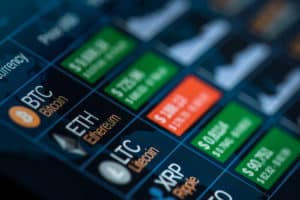 Simon Forster and Duncan Trenholme, co-heads of digital assets, TP ICAP: In 2023, we expect to see the continued institutionalisation of crypto, with more traditional customers coming to the market, as well as established crypto-native firms looking to move trading activity on to more traditional exchanges. We also expect to see a step-up in regulation of crypto and these cogs have already been set in motion by the FCA and other regulatory bodies. We look forward to seeing the successful launch of our Fusion Digital Assets spot exchange which will meet the growing demand from our traditional client base for credible infrastructure provided by recognised names with appropriate regulatory oversight.
Simon Forster and Duncan Trenholme, co-heads of digital assets, TP ICAP: In 2023, we expect to see the continued institutionalisation of crypto, with more traditional customers coming to the market, as well as established crypto-native firms looking to move trading activity on to more traditional exchanges. We also expect to see a step-up in regulation of crypto and these cogs have already been set in motion by the FCA and other regulatory bodies. We look forward to seeing the successful launch of our Fusion Digital Assets spot exchange which will meet the growing demand from our traditional client base for credible infrastructure provided by recognised names with appropriate regulatory oversight.
Alex Walker, VP global network sales for crypto, IPC: Under constant pressure from investors to seek out stronger returns, hedge fund attentions are still likely to be on the high risk/high reward world of crypto in the New Year. One of the attractive elements about crypto for the algo driven hedge funds is that the completely unregulated nature of the market is yielding some very strong returns for investors. However, 2023 could be the year where regulation of the crypto market starts to take shape – with directives such as ESMA’s Markets in Crypto Assets (MiCA) recently approved by the European Parliament. As the regulatory landscape becomes clearer, hedge fund managers currently reaping the rewards from a lighter touch regime will need to adjust quickly. This is when these same hedge funds will need a complete solution for their existing trading requirements to plug in to raw and normalised market data – not only connecting them to regulated crypto exchanges, but also to transit through to those major counterparty-to-counterparty hubs.
Edmond Goh, head trader, B2C2: Next year looks set to be a year of cautious rebuilding. Overall volumes will likely remain depressed to start as investors stay on the side lines barring any further shocks. The FOMO trade is dead and won’t be resurrected anytime soon. What will drive markets in its place? OTC volumes have been resilient in the face of negative news, indicating that market structures have matured despite these trying times. They will mature further next year as demand for transparency around firms’ balance sheets and business models grows. Trading will continue to shift from retail to institutional, so more TradFi best practices, such as risk management, governance, and accounting, will become the norm.
The institutional market will also move to establish clearer boundaries between trading and lending as crypto market structures evolve – a process that was happening before FTX imploded but will now accelerate as a result. At the same time, Defi markets and DEX’s are gaining share with retail traders, who potentially feel safer retaining custody of their funds. Crypto regulation will also accelerate next year. The European Union’s MiCA comes into force in Q1, but its limited geographic scope highlights the key issue: crypto is global and regulation local. How will governments address regulatory arbitrage? And what adjustments will they – and the entire industry – make in the wake of FTX’s collapse? It’s too soon to know the true extent of the fallout, but a more grown-up market is already appearing in its wake.
Toby Norfolk-Thompson, chief investment officer, Matrixport: We believe that decentralised finance (DeFi) is a game changer with the potential to financialise all aspects of life and collapse operational costs and risk. For instance, DeFi can unlock value for a huge range of assets such as membership rights or media royalties currently largely untouched by traditional finance and by making these assets available for transactions, substantial value can be created.Similarly, DeFi’s role in infusing transparency and accountability into financial services cannot go unnoticed. Ongoing developments in the digital assets industry have underscored the importance of segregating custody, clearing, and transaction settlement. In recent days we have seen trust collapse in a number of centralised financial platforms whilst DeFi has continued to perform and deliver. In the long term, we see this trend enabling all financial markets to become more decentralised via this technology.As DeFi increases in systematic importance, regulators around the globe will be motivated to develop qualifications and certifications for digital asset financial services to instil investor confidence in decentralised markets. This endeavour will be coupled with more research and education about the underlying technology and its applications, ultimately accelerating the adoption of DeFi.